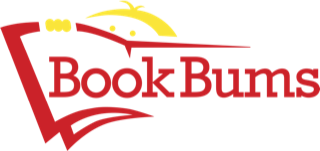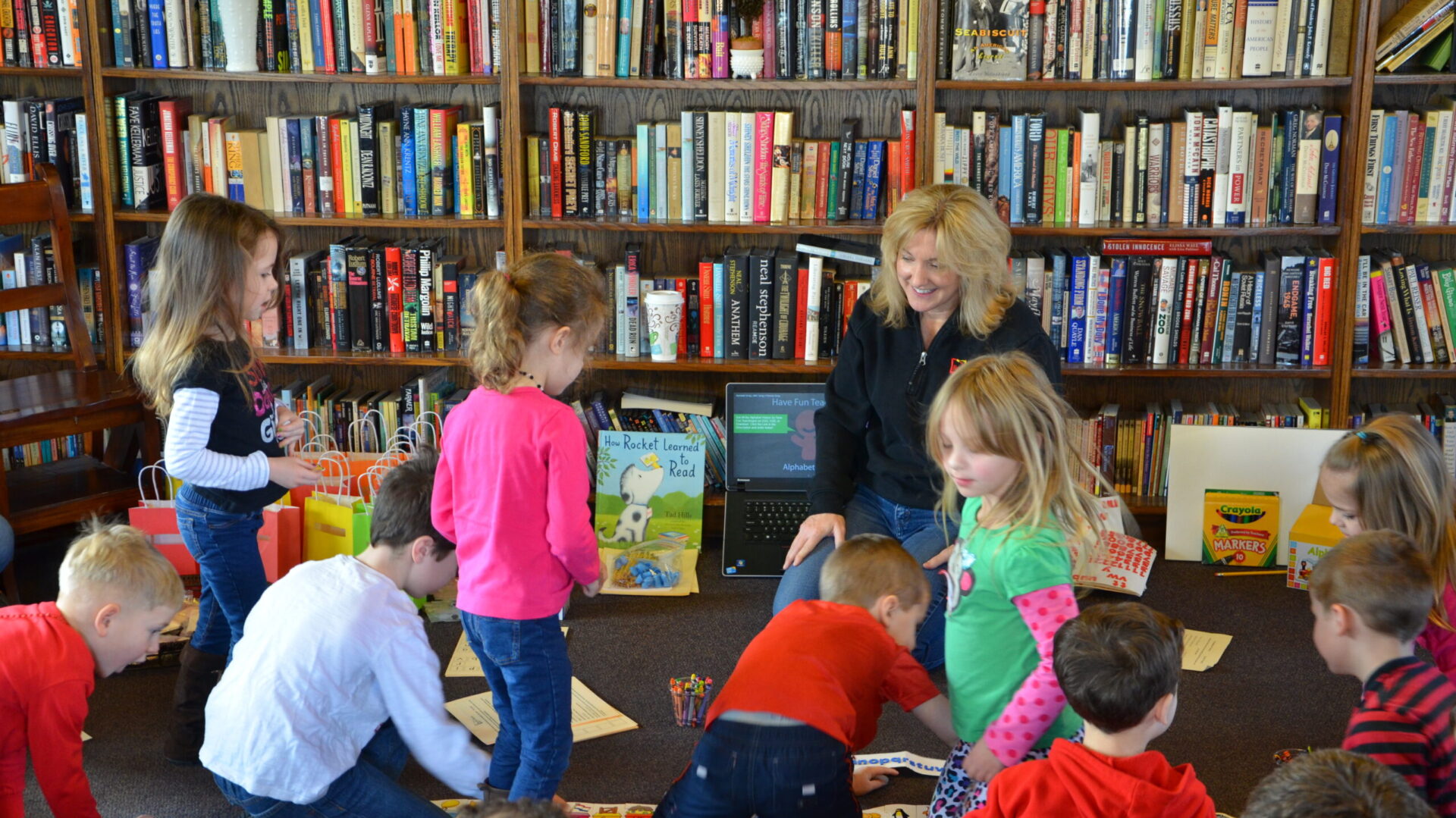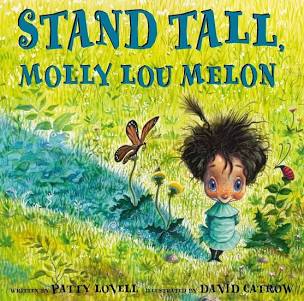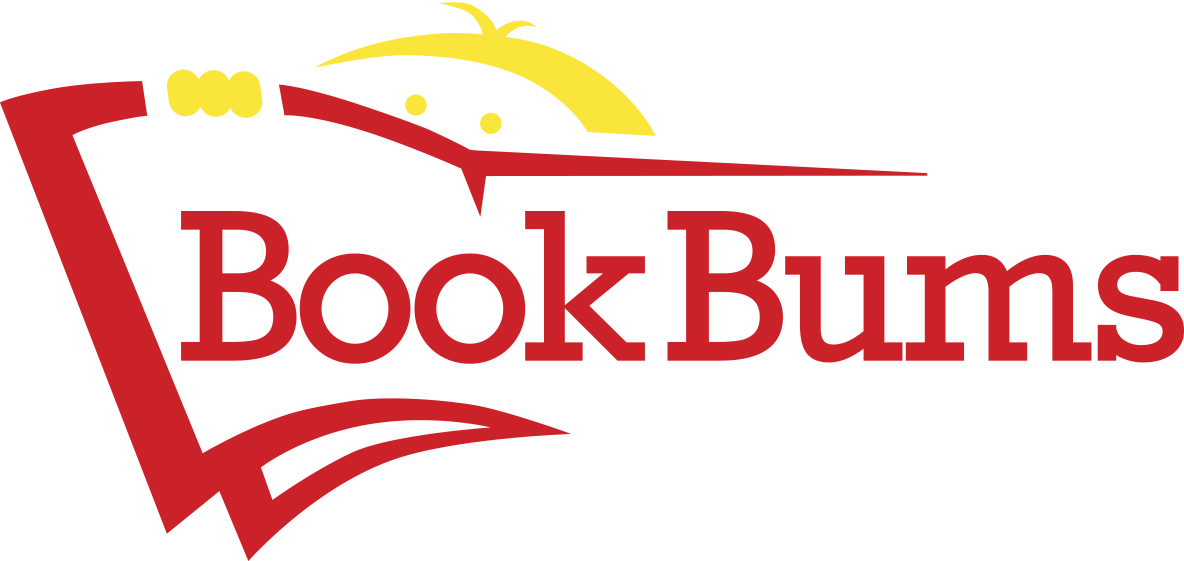
Hello Book Bums families!
Welcome to 2025! For many people, the new year is a season of fresh starts, so in this week's newsletter we have book recommendations to build confidence, ideas for encouraging your kids by thinking out loud, and a whole list of ways to build reading time into your family. There's also a special invitation from Dr. Christy. Read on and enjoy!
Bookbums.com is an Amazon Associate; We earn from qualifying purchases. This means that if you click on a link to Amazon.com and make a purchase, We may earn a small commission at no extra cost to you. We do recommend the products. Feel free to find them by other means.
Word of the Week
technique (teck-neek) noun/person, place, or thing - a skill in a particular field
Since Maria was a beginner, she admired her piano teacher's proficiency and technique at the keyboard.
Literary Calendar
• January 12 is "I'm Afraid I Can't Do That" Day.
• In 2001, A Space Odyssey, HAL first goes online on January 12.
• If you don't know the movie, the famous moment involves the AI technology taking over from the human astronauts. You can watch the scene here.
Wordology Workshop
• The Greek root techn means art or skill.
• You can find it in words like technician (a person with specialized skills), pyrotechnics (the art of making a fireworks display), and our Word of the Week technique.
• Of course it is also the root of technology, such as the computer system HAL mentioned in our Literary Calendar section.
From our Bookshelves
If there’s a child you love (especially one who might struggle a bit with self-esteem), Stand Tall, Molly Lou Melon by Patty Lovell might be the perfect book to read together—especially if you’re a grandma. Though Molly Lou Melon gets teased from time to time, she remembers her grandmother’s words and faces her world with confidence—even with its bullies—and she comes out on top. Molly Lou Melon realizes that her grandma was right about everything. When we can find confidence in what makes us unique, we simply don’t have to worry about what others think. There are other Molly Lou Melon books you might enjoy as well. Look for these at your local booksellers or check them out on Amazon.
Tips for Families
It’s a new year, and you just might be thinking about how to be more diligent when it comes to promoting academics with your kids for this second half of the school year. I have a tip for you: Talk with your kids about times when you struggle to understand things. Whether it’s filing taxes, reviewing a difficult project report for work, or trying to read a book that’s outside of your comfort zone, kids greatly benefit from knowing that everyone must navigate challenging texts and tasks from time to time.
Adults typically make reading look effortless, but we can all recall pointing our fingers to the page and whispering the words aloud to make ourselves pay attention, asking Siri to provide definitions for unfamiliar words, and having to really work to get into the flow of texts with unique dialects. (Is anyone else reading James by Percival Everett?)
Talk about it when you struggle and share what you do to navigate those frustrating times. It’s especially beneficial when they see you struggling and you “think aloud” to model how you deal with it in the moment.
The next time you’re in the car in an unfamiliar area, instead of shouting, “Guys, be quiet. I can’t concentrate when you’re so loud!” try to use that space to share what’s happening in your mind and how you’re trying to deal with it. Try asking when they’ve felt the same way and talk about it. What works? What doesn’t?
In their days, kids experience the same kinds of things we do. It really helps them when they can learn from us about dealing with struggle.
• Remember that the Latin roon vis means to see, and the prefix re means again.
• So revision literally means to see again.
• In the following section, would you say that Judy Garland suggested revising the lyrics, or did she suggest editing them?
Tips for Raising Readers and Writers
You’ve likely made some resolutions for the new year. I wanted to share some tips from the National Education Association for promoting reading with your kids at home. They're spot on!
1. Read together every day. You can read the morning news at breakfast, share a story after supper, or cuddle up for a book at bedtime. A daily reading routine is something everyone can look forward to.
2. Talk and build vocabulary. Interesting conversations build vocabulary, language skills, and knowledge about the world. Talk is a child’s best source of exposure to new words and ideas.
3. Model reading. Kids want to do what the grownups do. Make sure your kids get to see you reading and hear you talk about it.
4. Point out print. Read and talk about the words you see in the world around you. There’s lots to read—signs, recipes, cereal boxes, instruction manuals, bus schedules, news, maps, and menus.
5. Visit the library. Take advantage of all the books, materials, story times, programs, and resources your local library has to offer.
6. Create a reading-rich home. Find books at the bookstore or yard sales. Provide a special shelf or basket for kids to keep their own books and one for library books. Make sure there are quiet, comfortable places to read.
7. Encourage your child’s reading. Praise the efforts of a soon-to-be or beginning reader. Make sure schedules of older readers include time for reading for pleasure.
8. Keep books handy. Stash books in your bag to read aloud when you travel or have to wait at restaurants or for appointments. Or keep eBooks on your phone.
9. Start reading traditions. Beyond bedtime stories, consider a special birthday book, holiday favorites, or a regular family read aloud night.
10. Let kids choose books. Offer titles that explore your child’s interests, expand horizons, and offer exposure to different kinds of writing. Show them there are books where they can see themselves and books where they can see the worlds of others.
11. Make everyone comfortable. Find a spot to read together where you are both comfortable. Sometimes kids have to move around to be comfortable.
12. Be an active reader. Use expressive voices for characters, make sound effects, and point things out in the text and illustrations when you read aloud.
13. Discuss what you read. Give your child enough time to absorb the story and look at the pictures as you read. Think aloud about what you are reading and looking at and encourage your child to do the same.
14. Ask questions when you read. Ask your child to guess what comes next. Ask open-ended questions that help them relate to characters or events in the book. Let your child get involved and ask questions too–interruptions are okay!
15. Encourage re-reading. Repetition helps kids learn. Re-reading favorite books and poems helps kids make meaningful connections between themselves and books.
16. Connect reading and writing. Write your own reading material, like a story about your life, a story featuring your kids, or a story kids make up.
17. Make media matter. Connect kids with appropriate technology—videos, apps, or games that help them learn new words and interesting things about the world.
18. Get help. If you have concerns about your child’s language development, hearing, or vision, see your child’s pediatrician as soon as possible.
19. Make reading an experience. Link life experiences with books, like a trip to the zoo and books about animals, or planting a garden and reading The Ugly Vegetables by Grace Lin.
20. Have fun. Your idea of fun may differ from your child’s, so appreciate your child’s special joy for learning new things. Try different approaches, such as having them read to you or acting out a favorite story. Even something as simple as a story time outside can make reading together livelier and more memorable for you and your child
Practical Grammar
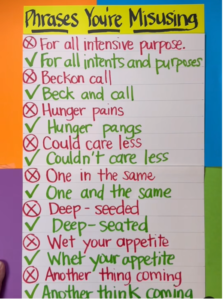
How many of these did you miss? I missed two.
I think I say, “It’s one in the same,” but it’s supposed to be “It’s one AND the same.” Huh.
I also missed, “… another think coming.” What in the world?!
That made no sense to me, so I did some investigating. Here’s a bit from an entertaining article I thought you might enjoy.
I don’t want to make a big thing about it, but I do think ‘think’ makes more sense when using this phrase.
I blame Judas Priest. It’s hard to compete with the eight minutes of metal mayhem that is their anthem You've Got Another Thing Comin'. Yes, “Thing” (sic). But if you think I’m going to give in, you’ve got another think coming. I’m choosing my words carefully: another think coming. Think. Not thing.
You can see how it works:
1 You think something.
2 You are wrong, or someone thinks you are.
3 You have another think coming.
Hm. What do you think?
.
News from Book Bums

I’ve read some books, lately, that have encouraged me to stretch beyond my comfort zone. I’d like to expand my reach and grow as an entrepreneur and as an expert in my field. I’m wondering if anyone of you has similar aspirations and would like to team up. If so, email me at christy@bookbums.com.
Just for Fun

I think you have to be old to get this one, but it's funny! Get in on the joke with this video.
If you know someone who would benefit from our newsletter or tutoring at Book Bums, please share this email with them! Thank you.
Copyright © 2024 Book Bums, All rights reserved
Our mailing address is:
7967 Cincinnati-Dayton Road Suite L
West Chester, OH 45069
